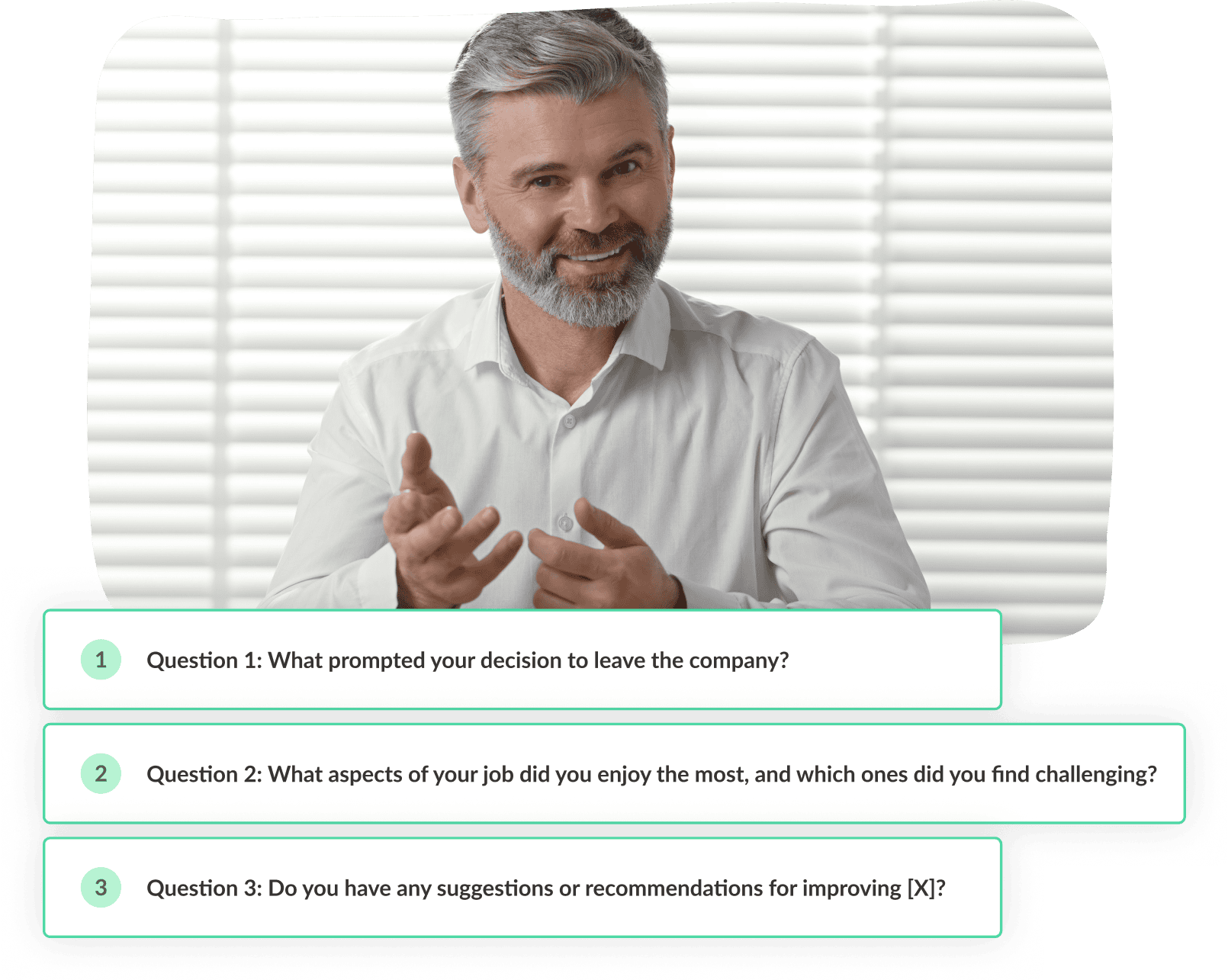How to Conduct Effective Exit Interviews
Written by
Sam CookAbout the Author
Sam is an educator with ten years of mentoring experience and currently specializes in employee engagement and research.
Reviewed by
VidCruiter Editorial TeamAbout the Author
The VidCruiter Editorial Team offers practical recruitment advice, drawing on insights from seasoned professionals. Our award-winning content, supported by industry specialists, underscores VidCruiter's dedication to innovation in recruitment.
Last Modified
Mar 6, 2024
An exit interview is a type of interview that an employer has with an employee after they resign. It’s a tool for companies to learn more about why an employee is leaving and their overall experience with the organization.
What is an Exit Interview?
An exit interview is a way for organizations to garner insights from an employee who is leaving. Typically conducted in-person or via survey, the goal is to better understand employees’ past and current feelings about the company and what motivated them to resign from the job.
What do employees want to discuss in exit interviews?
According to a recent survey, most professionals are “specifically open to commenting on company culture (72%), mental health implications of the role (72%), their line manager (70%), and their colleagues and peers (69%).”

Exit Interview Benefits
Exit interviews can be a little uncomfortable for both parties, even if the employee is leaving on good terms. However, if you skip them, you could miss out on collecting valuable insights that could drive meaningful change in your organization.
Here are a few key benefits to conducting exit interviews.
1. Understand the Reasons Behind Employee Turnover
Exit interviews show the bigger picture behind employee turnover and highlight the most significant reasons employees leave. For instance, if most departing employees mention a toxic work culture during their exit interviews, it shows that it is an important issue you need to prioritize and address.

2. Gather Feedback for Organizational Improvement
Exit interviews also reveal areas for growth. For example, if multiple employees mention a lack of training opportunities as their reason for leaving, focus on providing better training programs for new hires.

3. Enhance Employee Experience
It may be too late to make improvements to retain an employee who has already resigned, but you can still turn things around for current and future employees. For example, if multiple employees have problems with one manager, consider enrolling that manager in a leadership training or support program.

The real cost of employee turnover.
According to Culture Amp research, replacing an employee can cost anywhere from 30% to 200% of the departing person’s salary.
How to Conduct an Exit Interview
When done correctly, an exit interview will give you valuable insights for reducing turnover, improving your employee experience, and boosting your organization’s overall productivity and culture.
However, engaging with a departing employee is a sensitive situation, so you need to be prepared. Here’s a simple guide with some exit interviews best practices.
- Consider the interview method. In-person interviewing, phone interviewing, or video interviewing allows for higher-quality conversations and deeper insights. However, surveys allow you to collect responses faster and at scale. They may also reveal more honest answers due to their anonymity.
- Prepare relevant questions. Focus on the employee’s experiences, reasons for leaving, and suggestions for improvement. Also keep your interview questions open-ended to encourage detailed responses.
- Follow a structured format. A structured interview approach ensures that you cover all the important topics, allows you to identify trends across responses, and make meaningful comparisons over time.
- Choose an appropriate setting. For interviews, choose a quiet, private, and neutral location where the employee can speak openly.
- Be aware of your tone and approach. Aim to create a warm, welcoming atmosphere and use a relaxed and non-threatening tone to help the employee feel comfortable and reduce interview nerves. Listen actively and show empathy towards their experiences and reasons for leaving.
- Keep interview information confidential. Even though a departing employee may be more open about their experience than current staff, they might not want to be too honest for fear that somebody could share their responses with their previous manager or future employer. Assure them that you will keep their comments confidential.
- Use the data constructively. Analyze the input gathered from exit interviews and use it to make positive changes within the organization.
The Key Exit Inteview Questions to Ask
Like any interview, the types of questions you ask in an exit interview and how you ask them can make all the difference.
With an exit interview, bad questions are any that are overly broad or vague like “Did you enjoy your experience here?” or “How can we improve?”. Instead, be specific about what areas you want their opinions on.
If you’re short on time, here are the three most important questions to ask:
- What prompted your decision to leave the company? Understanding the reasons behind the employee’s decision to resign provides insight into what aspects of your organization need the most attention.
- What aspects of your job did you enjoy the most, and which ones did you find challenging? This question will pinpoint what’s working well and what needs improvement in the organization.
- Do you have any suggestions or recommendations for improving [X]? This question invites departing employees to give helpful feedback and suggest ways to make the workplace better, whether it’s about the environment, processes, policies, or culture.
We’ve also included a more comprehensive exit interview template below. Keep in mind you don’t need to ask every single question in this template. Use it as a guide and feel free to adjust the questions as you see fit.

Exit Interview Template
Introduction
Welcome the employee and express appreciation for their time.
Explain the purpose of the exit interview: to gather feedback and insights to improve the organization.
Assure confidentiality and emphasize the importance of honesty.
Warm-up Questions
How would you describe your experience working here, including your role, team dynamics, and interactions with your supervisor?
What were some of the highlights or positive aspects of your time here?
Reasons for Joining and Leaving
What initially attracted you to join our company?
What factors influenced your decision to leave, and what ultimately led you to follow through?
Job Satisfaction
Can you share what you enjoyed most about your job and what aspects you found challenging?
Were there any specific challenges or areas of dissatisfaction during your time here?
Work Culture
What are your thoughts on the company culture and how it impacted your experience?
Can you describe any specific cultural aspects that stood out to you during your time here?
Work Environment
How would you describe the work environment at [Company Name]?
Were there any factors that positively or negatively influenced your work environment?
Management and Leadership
How do you feel about the effectiveness of management and leadership?
Were there any specific interactions with managers or leaders that stood out to you, either positively or negatively?
What was a situation that senior leadership handled well or didn’t handle well?
Career Growth and Development
How do you feel about the career growth and development opportunities here?
Were there any areas where you would have liked to see more support or advancement opportunities?
How well do you feel your professional goals matched the opportunities the organization provided?
Perceptions of the New Workplace (if applicable)
How do you perceive your new company’s workplace culture and environment compared to here?
Are there any differences or similarities between your current workplace and ours?
Suggestions for Improvement
Based on your experience, what recommendations do you have for improving [X]?
Are there any changes you suggest to enhance the overall employee experience?
Closing
Thank the employee for their time and honesty.
Reiterate the confidentiality of the conversation.
Offer any assistance or support during the transition process.
Provide contact information for follow-up if they have additional comments later on.
What You Need to Know as an Employee
As an employee, an exit interview is a chance to express yourself candidly. You may feel you have nothing to lose since you’re already on your way out. However, even if you’re not leaving on the best terms, you should still aim to leave a good last impression, as you never know who you might cross paths with in the future.
Here are some tips on approaching an exit interview as an employee.

Be Honest and Specific
This is an opportunity to discuss issues you may have been concerned about sharing before. However, if you’re worried about being too negative, talk about specific situations you faced rather than general complaints.
For example, instead of saying, “There are no growth opportunities here,” you could mention specific times when you wanted to take on new challenges but didn’t get the chance. For example, you could talk about times when you tried to lead projects or learn new skills but didn’t get the opportunity. Citing specific instances makes your observations more tangible and actionable for the organization.
Maintain Professionalism
Even if things were tough, being rude won’t help anyone. Treating it as a vent session or therapy appointment isn’t helpful either. Keep your emotions in check and focus on behaviors rather than your impression.
For example, instead of saying, “My manager is toxic,” you could describe specific actions or situations that bothered you. Something like: “I’ve noticed that my manager interrupts us often during meetings and doesn’t listen to our ideas. As his direct report, it makes me feel like my opinions aren’t valued.” This way, you’re focusing on what your manager does rather than labeling them as toxic, which keeps the conversation constructive.
Provide Constructive Feedback
Even though things didn’t work out for you, it doesn’t mean you can’t help improve things for current and future employees. Offer potential solutions or suggestions addressing the issues you faced.
Also, remember to talk about the positive aspects of your experience with the company. Share your accomplishments, projects that went well, and other highlights from your tenure. You will leave a better final impression, and help the organization understand what they need to double down on going forward.

How Can Companies Analyze Exit Interview Data
It’s not enough to just conduct exit interviews. You also need a plan for how you will review and analyze the data to make changes and improvements.
Here are a few different data analysis methods to consider.
- Quantitative Analysis. Use structured interviews to sort out what departing employees say into common topics, like work environment or career growth, and see which issues are most prevalent.
- Qualitative Analysis. Review the full comments from departing employees to better understand their experiences and see the details behind the numbers.
- Trend Analysis. Track exit interview data over months or years to see if there are any patterns or changes in why people leave and spot recurring issues.
- Comparative Analysis. Compare exit interview data with other employee feedback metrics, such as engagement surveys or performance evaluations, to see if there are any correlations.
- Benchmarking. Set benchmarks based on qualitative data to see if issues are improving or worsening and where the organization may need to focus.
Once you’ve analyzed your data, here is what you need to do to put it into action:
- Identify common themes or issues raised by departing employees. You may also consider segmenting the data based on department, seniority, or location.
- Determine potential solutions. Brainstorm ideas or go through your exit interview data to see if there are any workable suggestions.
- Implement solution and track performance. Create an action plan and determine the KPIs you will monitor to track performance.

Exit Interview Challenges and Limitations — and How to Address Them
Even with all the right support and preparation, exit interviews aren’t a perfect feedback tool. It can be tough to get the insights you’re looking for from a potentially disgruntled employee, and even harder to turn those insights into actions.
Here are some of the challenges and limitations to be aware of and how to mitigate them.
- Getting employees to participate. Employees might skip exit interviews due to time constraints or feeling uneasy about sharing their true thoughts and feelings. To fix this, explain to them why these interviews matter and promise to keep their comments confidential.
- Getting honest answers. Employees might not tell the whole truth because they're worried about the potential blowback. Make them feel more comfortable by prioritizing their psychological safety or using anonymous surveys or third-party tools to solicit more candid responses.
- Analyzing the data. Sorting through all the data you collect and pulling out meaningful insights can be difficult and time consuming. Using the same interview questions and reviewing the data regularly will help you stay organized.
- Reactive approach. Since exit interviews occur after a person has resigned, you miss out on the opportunity to retain them. Having regular check-ins with employees will help you catch problems earlier.
- Exit interviews don’t show the full picture. They only give you a sense of how your departing employees feel. Use other feedback tools, like surveys or group talks, to get a better idea of how the rest of your staff feel.
- Taking action on insights. Regularly review the data, make a plan, and show your employees that you’re listening and acting on what they’re saying.
‘Ghosting’ exit interviews is a growing problem
According to a Capterra study, 86 percent of HR workers say at least one employee didn’t attend their exit interview, and 70 percent say multiple employees didn’t.

Building A Culture of Continuous Feedback
Exit interviews help you understand why employees leave so you can make changes for the better. However, waiting until someone leaves to learn about their experience isn't the best strategy. Make sure you’re collecting feedback regularly, not just when someone's on their way out the door.
Listening to employees' thoughts and concerns throughout their time with the company will enable you to stay ahead of issues, make continuous improvements, and create a workplace where everyone feels heard and valued.

Frequently Asked Questions
How Can Anonymity Be Ensured in Exit Interview Surveys?
Third-party tools or anonymized surveys can be used to collect employee feedback for exit interviews, or personal identifiers can be stripped from all data before being processed.
How Can Organizations Encourage Employees To Participate in Exit Interviews?
Emphasize the value of their feedback, assure confidentiality, and prioritize their comfort to encourage participation. In some organizations, additional incentives are used like small value gift cards.
What Are the Disadvantages or Detractors of Exit Interviews?
Exit interviews can sometimes lack candidness due to fear of reprisal or minimal employee investment in the outcome. They can be resource-intensive, provide delayed or disconnected insights, suffer from low participation rates, and may result in inaction if feedback is not systematically analyzed and acted upon, limiting their effectiveness in driving meaningful change.
Related Topics
Modernize your hiring process with expert insights and advice.



